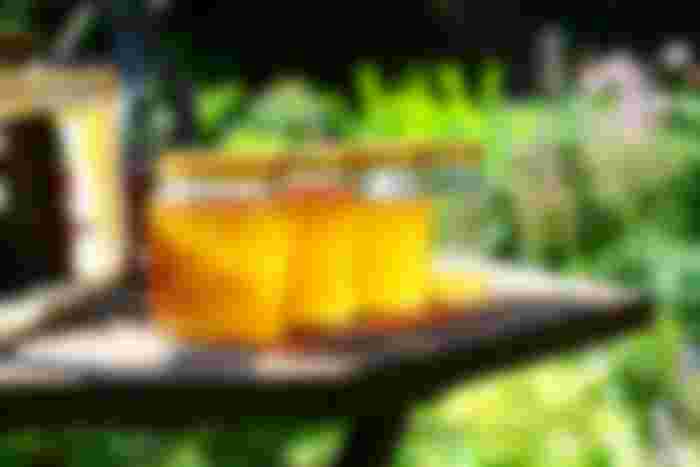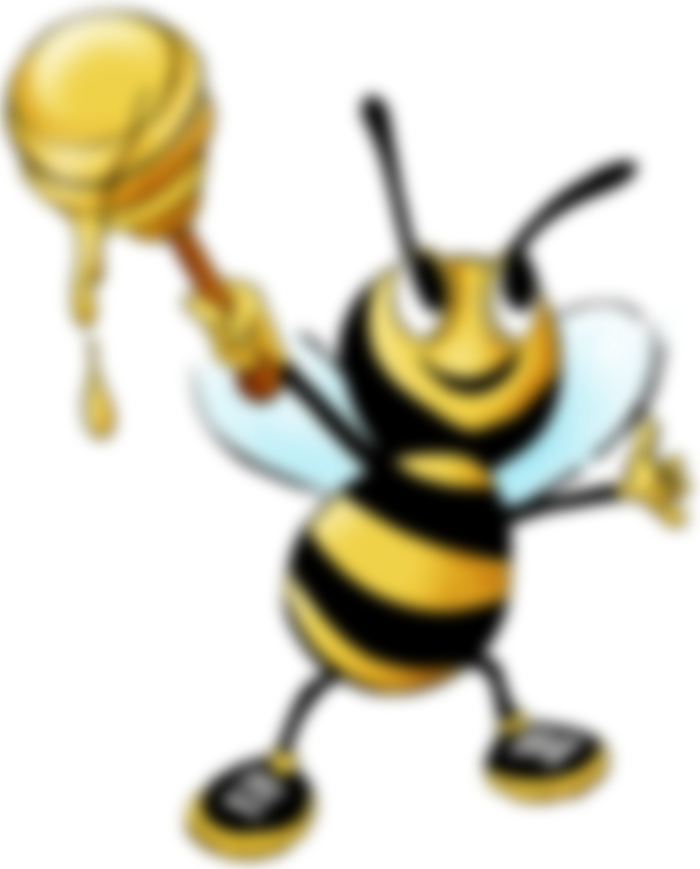Surprising Health Benefits Of Honey
Friends, the discovery of the health benefits of raw honey left me astounded! I want to share them with you. Most of you know how narrow-minded I've become in recent years, concerning sugar, and the detrimental consequences of the consumption thereof. However, while reading the Bible I stumbled upon three very interesting verses. Those are Isaiah 7:15, Proverbs 16:24, and Proverbs 24:13, which says "eat honey, my child.". I've learned to trust and rely on the Word. The inner voice immediately suggested searching for scientific works, despite my KETOgenic stubbornness. The following information is taken from the works I've read. The one I recommend reading is: https://www.ncbi.nlm.nih.gov/pmc/articles/PMC5549483/
Bees are interesting workaholics. They often work themselves to death. An adult bee may fly up to four miles daily in search of food! There are over a thousand different bee species and only a handful of them are honey makers. Europe is dominated by two honeymaking species, which are becoming more endangered, due to chemtrails, and chemicals we use for agriculture. My neighbor is a beekeeper. Sadly, most of his bees died last spring, two days after the sky got filled with trails. 😔 With that being said, don't take another spoon of honey for granted. It took a lot of time and dedication for it to be made.
Aside from honey, bees are also offering plenty of other products, such as royal jelly, and propolis, both of which are (scientifically) proven to be beneficial for our health! The ancient Egyptians knew that very well! If I'm not mistaken, they even came up with some of the by-products we still use today, such as ear candles. A few months ago, while doing my research on the differences in waxes, I learned that the burning of beeswax (and coconut wax) has a profound effect on the human skin and nervous system. The effects are almost identical to those of red-light therapy. Perhaps, we should devote more attention to our little friends, who are maintaining the natural order, and keeping us all alive!
Except as energy-providing food, the ancient Egyptians, Greeks, Romans, Chinese, and Indians also used honey to treat wounds, diseases of the gut (including gastric ulcers), cough, sore throat, earaches, eye infections, allergies, and so on. They were aware of honey's biological, physiological, and pharmacological activities. Honey consists of fructose, glucose, and other sugars...a bit of protein, organic acids, multi-minerals, amino acids, vitamins, phenols, and minor amounts of bioactive components (including phenolic acid and flavonoids).
According to a review of "advances in the analytical methods for determining the antioxidant properties of honey", honey constituents with health benefits include phenolic acids, flavonoids, ascorbic acid, proteins, carotenoids, and certain enzymes, such as glucose oxidase and catalase.
Honey is highly rich in bioactive compounds (click here to read the full list). To summarize, essential and nonessential compounds, such as polyphenols and vitamins occurring naturally as part of food chains, are considered bioactive. In honey, phenolic compounds are commonly present as flavonoids which contribute to the functional properties of bee products, including their antioxidant, antimicrobial, antiviral, anti-diabetic, anti-cancer, gastroprotective, anti-inflammatory, antifungal, wound healing, and cardioprotective activities.

Wound Healing
Back in the days of my childhood, I've often been covered in wounds, thanks to my bicycle riding adventures. My mother praised hydrogen peroxide, but I personally never liked it. It's less painful than pure alcohol, nevertheless, it still seemed "wrong". Then, one day, I was visiting my grandma, and a cousin asked for a bike race. Not only did I end up crashing in nettles, but also covered in wounds, thanks to a fence of thorny blackberries. My grandma covered all of my wounds with raw honey, which worked very fast! In the morning, all wounds were already healed. Talking from experience, I assure you, that raw-honey works much faster than alcohol and hydrogen peroxide (and it doesn't hurt). Besides wound treating properties, honey can also be used to treat insect bites, burns, skin disorders, and so on... Guess what! Clinical evidence supporting the effectiveness, and sensitivity of honey in wound care indicates that the performance of conventional and modern wound care dressing is inferior to that of using honey, as confirmed by a systematic review of dressings and topical agents for surgical wounds healing by secondary intention. Parents! Take notes! Here comes the shocker: certain cases have shown that honey stimulates wound-healing properties even in infected wounds that do not respond to antiseptics or antibiotics and wounds that have been infected with antibiotic-resistant bacteria.

Oral Health & Gastrointestinal Disorders
Honey's sugar molecules are in a form that can be easily absorbed by the body. Honey also provides nutrients (such as minerals, phytochemicals, and flavonoids) that aid digestive processes in the body. Pure/raw honey has bactericidal properties against pathogenic bacteria and enteropathogens, including Salmonella, Escherichia Colli, and similar "gram-negative" species! A study of medicinal uses of honey shows that natural honey contains a high amount of prebiotics which increase the population of Bifidobacteria, a very important and beneficial microbe!
Honey is also an effective agent for the treatment of many oral diseases, including periodontal disease, stomatitis, and halitosis. In addition, it can also be used as a prevention agent of dental plaque, gingivitis, mouth ulcers, and periodontitis (honey exerts antimicrobial activity against this anaerobic bacteria and prevents periodontal disease). A study of surgical wounds in the mandibular bed shows that the antibacterial and anti-inflammatory properties of honey can stimulate the growth of granulation tissue, leading to the repair of damaged cells.
How does the honey treat the sore throat? Through simultaneous destruction of harmful microbes (such as Streptococcus) and coating of the inner lining. A survey for the Journal of Alternative and Complementary Medicine has demonstrated that honey is superior to other treatments for cough induced by upper respiratory infections, including dextromethorphan and diphenhydramine. The antioxidant and antimicrobial properties of honey aid in minimizing persistent cough and ameliorated sleep!
Honey also helps "the victims" of gastroesophageal reflux disease by coating the esophagus and stomach lining, thus preventing the upward flow of food and gastric juice. Honey can assist in the regrowth of the tissues on the sphincter, which decrease the chances of acid reflux. My mother had gastroesophageal reflux disease for decades. She says the condition was caused by stress. Well, I recommended a teaspoon of honey, instead of coffee in the morning. She listened to my advice, and hasn't complained ever since!

Gastritis, Gastroenteritis, and Peptic Ulcer:
Honey has been identified as a potent inhibitor for gastritis, and Helicobacter pylori (the peptic ulcer-causing agent). A clinical survey (gastroprotective effect of honey and bee pollen) has shown that honey decreased the secretion of gastric acid and increased the healing effect. Glucose oxidative conversion to gluconic acid by glucose oxidase releases hydrogen peroxide, which functions as an antibacterial agent, and results in a high-sugar content of a low pH (approx. 4.4). A clinical study (https://www.liebertpub.com/doi/full/10.1089/jmf.2009.0075) found that replacing the glucose in standard electrolyte oral rehydration solution with honey reduced the recovery time of patients with gastroenteritis because the high sugar content in honey boosts electrolyte and water reabsorption in the gut, meaning, it also boosts energy (speeds up the treatment of chronic fatigue) and improves the mental condition.
Two studies proved that honey minimizes the pathogenesis and duration of viral diarrhea compared to conventional antiviral therapy. Inflammatory bowel syndrome (which causes severe constipation, bloating, and stomach discomfort) was successfully treated with raw honey on an empty stomach! Studies:
a) https://worldveg.tind.io/record/48511/
b) https://www.ncbi.nlm.nih.gov/pmc/articles/PMC4144894/

Due to antioxidant activities, honey can balance the liver systems, neutralize toxins, and soothe the pain. Several studies reported that honey which has a 1:1 ratio of fructose to glucose MAY help to promote better blood sugar levels, which SHOULD help those suffering from fatty liver. If Dr. Eric Berg heard what I just said, he'd most likely wish to send me off to space, without a way to get back...😁
Here are the studies which back my claims:
a) https://pubmed.ncbi.nlm.nih.gov/20398890/
b) https://www.ncbi.nlm.nih.gov/pmc/articles/PMC3065678/
Honey (allegedly) provides adequate glycogen storage in liver cells. Why is that important? Because the insufficient glycogen storage in the liver releases stress hormones that impair glucose metabolism over time. Impaired glucose metabolism leads to insulin resistance and is the main factor of fatty liver disease. This is the exact opposite of what I've been taught (honey DOES spike insulin). Could it be that even though it spikes insulin, at the same time, it can be used to cure insulin resistance, which is a culprit behind numerous diseases, such as diabetes type II?
Man's Best Choice
Elisha Long said he eats raw honey approximately half an hour before hitting the gym. What for? Boron & nitric-oxide! Boron promotes healthy testosterone levels, while nitric oxide is essential for the proper functioning of the cardiovascular system. It also expands the blood vessels and eases the blood flow (lowers the blood pressure). When combined with healthy activities (HIIT exercises, etc.), honey can contribute to the treatment of erectile dysfunction. A study published in 2010 indicates honey's ability to exhibit cardioprotective effects such as vasodilation, balance vascular homeostasis, and improve lipid profile. It has also been said, that honey may decrease the ability of platelets to form clots. Honey's flavonoids improve coronary vasodilation, while polyphenols reduce atherosclerotic lesions through the downregulation of inflammatory and angiogenic mechanisms.

If you're interested in learning more about honey, I urge you to read the study pinned to the top, which states that honey has the potential of curing several types of cancer (including breast cancer & colorectal cancer). Here is the crucial part of their conclusion: "Tumors, malignancies, and cancers are usually enhanced by obesity and insulin-resistant type 2 diabetes mellitus. Honey components such as quercetin revive insulin resistance, which leads to anticancer activities"! Read my article on the silent pandemic: https://read.cash/@Gemstone/the-silent-pandemic-3963b3ff
I'm sure you'll connect the dots. (Basically, the end product of sugar is cancer). I'd speak more about the anticarcinogenic properties of honey, but that'd increase the risk of my profile being censored/banned or even terminated. 😶
Conclusion
Today, approximately 300 types of honey have been recognized. Sufficient (undeniable) evidence and scientific data are available to encourage further research. As the faith in modern-petroleum-based medicine is plummeting, more and more people are joining the quest for ancient solutions. When compared with other potential cures, honey is an almost entirely risk-free solution for a wide spectrum of health-related problems.
I sincerely hope you learned something new by reading this article! 🤗
Truly yours; Gemstone






Wow, never heard about all of those benefits that honey has. All I knew is that I enjoy eating it HAHA. Anyway. Atleast now, I am already aware of all of the benefits it can give to us humans, thus, I now have scientific reasons to pursue consuming it.